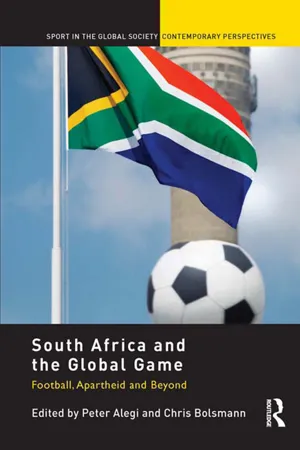
South Africa and the Global Game
Football, Apartheid and Beyond
- 186 pages
- English
- ePUB (mobile friendly)
- Available on iOS & Android
South Africa and the Global Game
Football, Apartheid and Beyond
About this book
Firmly situating South African teams, players, and associations in the international framework in which they have to compete, South Africa and the Global Game: Football, Apartheid, and Beyond presents an interdisciplinary analysis of how and why South Africa underwent a remarkable transformation from a pariah in world sport to the first African host of a World Cup in 2010. Written by an eminent team of scholars, this special issue and book aims to examine the importance of football in South African society, revealing how the black oppression transformed a colonial game into a force for political, cultural and social liberation. It explores how the hosting of the 2010 World Cup aims to enhance the prestige of the post-apartheid nation, to generate economic growth and stimulate Pan-African pride. Among the themes dealt with are race and racism, class and gender dynamics, social identities, mass media and culture, and globalization. This collection of original and insightful essays will appeal to specialists in African Studies, Cultural Studies, and Sport Studies, as well as to non-specialist readers seeking to inform themselves ahead of the 2010 World Cup.
This book was published as a special issue of Soccer and Society.
Frequently asked questions
- Essential is ideal for learners and professionals who enjoy exploring a wide range of subjects. Access the Essential Library with 800,000+ trusted titles and best-sellers across business, personal growth, and the humanities. Includes unlimited reading time and Standard Read Aloud voice.
- Complete: Perfect for advanced learners and researchers needing full, unrestricted access. Unlock 1.4M+ books across hundreds of subjects, including academic and specialized titles. The Complete Plan also includes advanced features like Premium Read Aloud and Research Assistant.
Please note we cannot support devices running on iOS 13 and Android 7 or earlier. Learn more about using the app.
Information
Football as code: the social diffusion of ‘soccer’ in South Africa
This essay explores the processes associated with the emergence of rugby and soccer as distinct ‘sporting codes’ in South Africa. Beginning with an elaboration of the concept of ‘sporting code’, the author traces in broad brush strokes the events that transformed the two English codes into new forms of cultural capital in transnational sporting fields. Set against this wider context, the focus then shifts to the ‘social diffusion’ of rugby and soccer in the territories that would subsequently constitute the South African state. It is argued that between 1859 and the discovery of gold in 1886 rugby and soccer emerged in two relatively distinct fields, centred on the British Cape and Natal colonies. The essay then explores the stratification of these fields, following the establishment of the Union of South Africa in 1910. Particular attention is given to the relative status of rugby and soccer in the colonial education systems and in the post-1910 national education system.
Introduction
‘Football’ as a sporting code
Codes, imperial ‘diffusion’ and cultural capital
Table of contents
- Cover Page
- Half Title page
- Title Page
- Copyright Page
- Contents
- Series page
- Abstracts
- Introduction
- 1. Football as code: the social diffusion of ‘soccer’ in South Africa
- 2. White football in South Africa: empire, apartheid and change, 1892–1977
- 3. A biography of Darius Dhlomo: transnational footballer in the era of apartheid
- 4. Women and gender in South African soccer: a brief history
- 5. ‘You must support Chiefs; Pirates already have two white fans!’: race and racial discourse in South African football fandom
- 6. ‘It wasn’t that I did not like South African football’: media, history and biography
- 7. Soccer in a rugby town: restructuring football in Stellenbosch
- 8. Differing trajectories: football development and patterns of player migration in South Africa and Ghana
- 9. Football’s tsars: proprietorship, corporatism and politics in the 2010 FIFA World Cup
- 10. Sports as cultural diplomacy: the 2010 FIFA World Cup in South Africa’s foreign policy
- 11. World Cup 2010: Africa’s turn or the turn on Africa?
- 12. The 2010 FIFA World Cup: critical voices from below
- Index